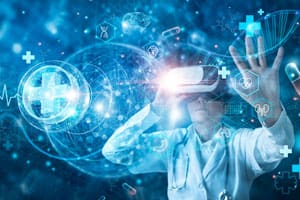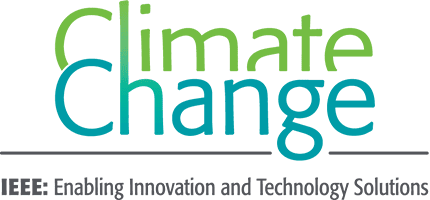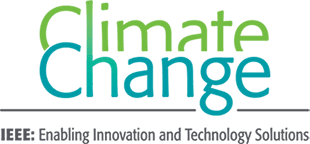Healthcare Technology Plays Role to Mitigate Impact of Climate Change
The impact of climate change poses significant challenges to our world, affecting not only our environment but also our health and well-being. Technology is playing a vital role in healthcare to mitigate these impacts.
NOTE: The views expressed here are solely those of the author and/or interview subject and do not represent positions of IEEE. Some references may require subscription to access content.
 The impact of climate change poses significant challenges to our world, affecting not only our environment but also our health. Rising temperatures, extreme weather events, and the spread of diseases are all consequences of a changing climate, and healthcare technology is playing a vital role to help mitigate these impacts.
The impact of climate change poses significant challenges to our world, affecting not only our environment but also our health. Rising temperatures, extreme weather events, and the spread of diseases are all consequences of a changing climate, and healthcare technology is playing a vital role to help mitigate these impacts.
IEEE Senior member Dr. Abhishek Appaji is Associate Professor at B.M.S. College of Engineering in Bengaluru, India, and is an active member of the IEEE Young Professionals Climate and Sustainability Task Force. Dr. Appaji’s background integrates engineering and medical electronics as well as mental health and neuroscience.
Below is a conversation with Dr. Appaji exploring the role of healthcare technology in supporting populations in an increasingly complex climate environment.
Q: What are some of the ways in which healthcare tech has evolved to address climate change concerns?
Dr. Appaji: To answer this question, we can consider a few of many aspects, including the adoption of renewable energy in healthcare facilities[1], minimizing the power consumption of medical devices and equipment, employing efficient data analytics, advancing telehealth and remote diagnosis capabilities, and utilizing wearable health-tracking devices. By effectively harnessing these tools, we can enhance patient well-being and equip them with greater resilience in the face of climate change.
Q: How does the integration of renewable energy sources into healthcare facilities contribute to improved patient care?
Dr. Appaji: The adoption of renewable energy offers significant benefits for reshaping the healthcare sector and mitigating its environmental footprint. By utilizing renewable energy sources, such as solar windows and solar-powered transportation for field disease screening, thermal pumps for regulating room temperatures, and refrigeration for storing medicines[2], hospitals and medical facilities can become more sustainable and accessible, ultimately enhancing the overall performance of healthcare systems. Furthermore, these renewable technologies can provide essential support to healthcare centers facing electricity shortages, particularly in remote and rural areas.
Q: Can you provide examples of innovative medical devices or equipment that have been designed with energy efficiency in mind? How do these devices function while minimizing their carbon footprint?
Dr. Appaji: I’m involved in the development of affordable medical devices, and one of my recent projects focused on creating a low-power digital X-ray machine. By incorporating energy-efficient sources and detectors into the X-ray machine, we were able to achieve significant energy efficiency. Another device is a smart refrigeration solution tailored for rural healthcare settings. In this endeavor, I focused on optimizing the Peltier module to ensure refrigeration remains operational without a constant power source, making it sustainable for extended periods.
Q: In what ways are data analytics and digital technologies being utilized to identify and address climate-related health challenges? Could you share some insights into how these technologies are being applied to improve patient outcomes?
Dr. Appaji: Climate-related health challenges encompass a range of issues, including mental health concerns, air pollution, heat-related illnesses, and allergens. Researchers and scientists worldwide are actively engaged in mining climate and temperature data and connecting it with health datasets. This collaborative effort assists policymakers and various agencies in visualizing the problem and crafting long-term solutions. Notably, with the rapid advancement of machine-learning and deep-learning technologies, many experts believe that data analytics is the most effective tool to address and provide solutions for climate-related health challenges. These analyses are enhancing our understanding of climate-related health issues, enabling the formulation of more inclusive policies and procedures to mitigate these challenges.
IEEE 1752.1-2021, Standard for Open Mobile Health Data—Representation of Metadata, Sleep, and Physical Activity Measures[3] provides standard semantics to help enable meaningful description, exchange, sharing, and use of mobile health (mHealth) data.
Q: Telehealth and remote monitoring have gained significant attention recently. How does the adoption of these technologies enhance healthcare access?
Dr. Appaji: The solution is embedded within the problem itself. Prior to the pandemic, telehealth was rarely chosen as a healthcare option. However, since then, telemedicine[4] and remote monitoring have become integral components of healthcare, particularly for less severe cases where physical interventions are unnecessary. By promoting telehealth as a viable option, we are reducing patient travel, subsequently lowering emissions. Additionally, both patients and doctors have grown more accustomed to and comfortable with using telemedicine apps, which enhances the overall safety and convenience of healthcare.
Q: Wearable health-tracking devices and apps are becoming more prevalent. How are these technologies assisting individuals in making informed decisions about their health while also potentially offering insights into environmental factors that might impact well-being?
Dr. Appaji: Wearable health-tracking watches and devices, along with their associated apps, have witnessed a surge in popularity in recent years. These devices generate health data that can be swiftly analyzed, providing individuals and their caregivers with valuable information to make informed decisions. Some apps are specifically designed for disease tracking, such as diabetes, making it significantly easier for both patients and doctors to adjust treatment plans and assess treatment outcomes. While most apps focus on general well-being rather than strict health tracking, they can still help prevent potential complications and offer predictive healthcare solutions. Additionally, there are even innovative devices, like smart yoga mats, designed to assist individuals with specific medical conditions.
IEEE Engineering in Medicine and Biology Society, also known as IEEE EMBS, is a great resource for engineers working in healthcare technology.
[1] P. A. Hohne, K. Kusakana and B. P. Numbi, “Economic Power Dispatch for Energy Cost Reduction of a Hybrid Energy System Considering Maximum Demand Charges and Time-based Pricing in a Healthcare Institution,” 2020 6th IEEE International Energy Conference (ENERGYCon), Gammarth, Tunisia, 2020, pp. 395-400, doi: 10.1109/ENERGYCon48941.2020.9236501.
[2] B. Gunapriya, K. Vinoth Kumar, G. Chennareddy, E. Kavipriya, S. Chitra and B. Sahana, “Renewable energy based efficient portable DC refrigerator for rural electrification and convenience – An Overview,” 2022 Second International Conference on Artificial Intelligence and Smart Energy (ICAIS), Coimbatore, India, 2022, pp. 1623-1628, doi: 10.1109/ICAIS53314.2022.9742945.
[3] “IEEE Standard for Open Mobile Health Data—Representation of Metadata, Sleep, and Physical Activity Measures,” in IEEE Std 1752.1-2021, pp.1-24, 16 Sept. 2021, doi: 10.1109/IEEESTD.2021.9540821.
[4] Md. Rokonuzzaman, M. I. Hossain, T. Islam, P. P. Sarkar, M. R. Islam and N. Amin, “Design and Implementation of Telehealth Device: Linking IoT Sensors to Cloud Networks,” 2020 IEEE-EMBS Conference on Biomedical Engineering and Sciences (IECBES), Langkawi Island, Malaysia, 2021, pp. 281-285, doi: 10.1109/IECBES48179.2021.9398755.


